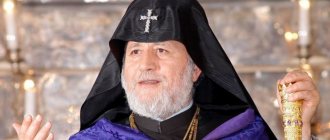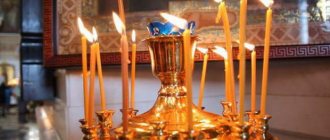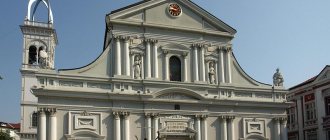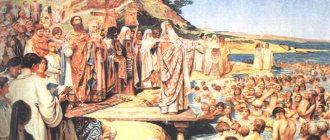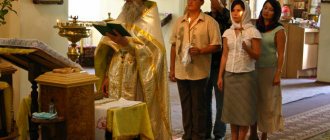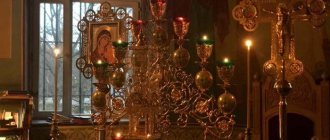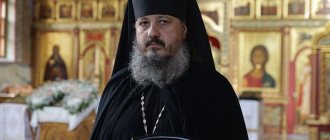Why is the Church called apostolic?
Today, brothers and sisters, the Apostle Paul addresses us all with these words: “If I am not an Apostle to others, I am an Apostle to you; for the seal of my apostleship is ye in the Lord” (1 Cor. 9:2). These words remind us of the most important characteristic of our Church. In the “Creed” we sing: “I believe in the one, holy, catholic and apostolic Church.” These four qualities: unity, holiness, conciliarity and apostolate are the main signs of the true Church. We have a reason to talk about the last quality, apostleship, today.
First of all, it must be said that the name “apostle” in Scripture designates not only the disciples of Christ. Christ Himself is called an apostle. For example, the book of Hebrews says, “Keep in mind the Apostle and High Priest of our confession, Jesus Christ” (Heb. 3:1). The word "Messenger" here is a translation from the Greek "apostolos". Also, the ministry of Christ is called apostleship: in the Epistle to the Galatians it is written: “When the fullness of the time was come, God sent forth His [Only Begotten] Son” (Gal. 4:4). “Sent” (in Greek “exapestile”) comes from the same root as the word “apostle.” Thus, Christ is, if I may put it this way, an Apostle of God the Father.
Christ's apostolate is also borne by His Church, which is the Body of Christ. From this we can understand one of the meanings of calling our Church “Apostolic Church.” The Church bears this high title according to the purpose of its existence. The mission of the Church in the world is the mission of Christ, the apostolic one. The church is given the commandment: “Go and teach all nations, baptizing them in the name of the Father and the Son and the Holy Spirit” (Matthew 28:19). This is a very important point - the great command of Christ is addressed not only to the apostles and their successors, the bishops, but to the entire Church, and concerns us all. If the responsibility to preach their faith lay only with bishops and priests, then church history would not know the face of equal-to-the-apostles laity. There would be no Equal-to-the-Apostles Thekla, nor Saint Nina of Georgia, nor Grand Duke Vladimir and Princess Olga, nor Equal-to-the-Apostles Constantine and Helen in our calendar. These people did not have holy orders, but they enlightened thousands of people with the light of Christianity. Or, for example, Saint Gregory, the enlightener of Armenia, although he took holy orders, it was only after, thanks to him, Christianity became the official religion of Armenia.
Of course, brothers and sisters, this does not mean that we should all run out into the street today with a Bible in our hands and start throwing ourselves at passers-by. No. You can preach in different ways, and that’s not what we’re talking about now. It is important to realize the very idea: the whole Church is called to preach. And how this thought will be realized in the life of a believer is a personal matter for each of us.
So, the Church is called apostolic because of the purpose of its existence. Further, it bears this name based on its foundation. Paul writes in Ephesians that the Church is built on “the foundation of the apostles and prophets” (Eph. 2:20). What does it mean? It was the apostles who stood at the origins of the historical existence of the Church, transmitted to it the teaching of faith and life, established the Sacraments and sacred rites according to the commandment of the Lord, and laid the foundation for its canonical structure. The Apostles are the founders of a number of Local Churches, which then, in turn, became the mothers of many other Local Churches.
Further, the Church is called apostolic because the apostolic Tradition has been preserved in it. This point is the most important. If all Orthodox Christians were well acquainted with this situation, it is unlikely that anyone would find compelling reasons for converting from Orthodoxy to Protestantism (which, unfortunately, happens). Starting from the day of Pentecost to our time, the living stream of grace of the Holy Spirit, transmitted through the Sacraments, continuously flows in the Church, and the correct teaching about the economy of our salvation is proclaimed. And this is the main point. What does a person need to be saved? Right faith and the grace of God. A person comes to church and hears words of truth and common sense. He comes and receives forgiveness of sins and grace-filled strength for growth in faith. The Church of Christ gives man the greatest treasure: correct teaching on how to be saved, and effective means for achieving his salvation. All this is contained in the Apostolic Tradition.
So, here are three reasons why the Orthodox Church calls itself apostolic: by the purpose of its existence, by its foundation, by the presence of the Apostolic Tradition in it.
All this, it would seem, should make an Orthodox person love the apostles of Christ, read their books, pray to them, study their lives. However, there is some damage in our church life regarding this topic. Firstly, in Orthodox circles it is considered absolutely normal not to know the apostolic epistles. Secondly, in our church piety there is no obligatory column about frequent and fervent prayer to the apostles of Christ. We pray much more to St. Nicholas, Spyridon, Panteleimon, Tatiana, than the twelve apostles. For some reason, Christ’s disciples do not deserve to become “our own”, “relatives” to us. This will be clearly visible if you pay attention to how many people are standing in the church in the service of St. Nicholas and how many are in the service of, say, the Apostle Thomas. Or at the service of the Great Martyr Barbara and at the service of the Evangelist Matthew. It is good that we love Nicholas and Varvara so much, but at the same time, unfortunately, the inferiority of our missionary consciousness is clearly revealed.
That is why, brothers and sisters, our self-awareness as an apostolic Church is so important. This is why Paul emphasizes that we must bear the “seal of apostleship.” The apostolate of the Church is not just words, but a worldview. One of the modern theologians wrote that a Christian is one who looks at the world through the eyes of the apostles. The apostolate of the Church is a spiritual reality in which we must live and be saved. Our faith originates from the apostles, and it will lead to them. For this is what is said about the heavenly Jerusalem, in which all Christians who please God will dwell: “The wall of the city has twelve foundations, and on them are the names of the twelve Apostles of the Lamb” (Rev. 21:14). In the city founded on the apostolic names, the Lord will settle all those who have the seal of apostleship on them, and we should all be like that.
May the words of today's reading help us patch up some of the holes in our church life, of which we have many, brothers and sisters. And we don't need to be afraid to admit it. An Orthodox person should always be ready to learn and improve. When the Orthodox Church says that everything is perfect in Her, then from minute to minute we can expect the end of the world. But as long as there are people who admit their illnesses and agree to be treated in Christ’s hospital called the Church, the world will stand. And first of all, it depends on us, to whom Paul, and in his person the other apostles, says today: “If I am not an Apostle to others, then I am an Apostle to you; for the seal of my apostleship is ye in the Lord.”
Content
- 1 Etymology
- 2 Use of the term 2.1 Spelling “church” with a capital or small letter
- 4.1 Boundaries of the Church in Catholicism
- 5.1 In the New Testament
Notes[ | ]
- M. Vasmer. Etymological dictionary of the Russian language. Article "Church"
- B. Heavenly triumphant Church - The saving fruits of the resurrection of Christ - The Resurrection of Christ - Part four. God is the Savior of the world - Orthodox Dogmatic Theology (undefined)
(inaccessible link). Access date: May 16, 2013. Archived December 3, 2013. - Church // The New Shorter Oxford English Dictionary (English) (Russian (English) / Lesley Brown. - Oxford: Oxford University Press, 1993. - ISBN 0-19-861134-X. “8. A non-Christian society or movement regarded as a religion or as having the social, ethical or spiritual qualities of a religion. Example: Church of Scientology
» - Zelenov L. A., Vladimirov A. A., Shchurov V. A.
History and philosophy of science: textbook. - Flint: Science, 2008. - 456 p. — ISBN 978-5-9765-0257-4 - Johann Jakob Herzog, Albert Hauck, Samuel Macauley Jackson, Charles Colebrook Sherman, George William Gilmore.
The New Schaff-Herzog Encyclopedia of Religious Knowledge: Embracing Biblical, Historical, Doctrinal, and Practical Theology and Biblical, Theological, and Ecclesiastical Biography from the Earliest Times to the Present Day.
- Funk and Wagnalls Company, 1969. - T. 3. - P. 75. - 259 p. "An extension has taken place in recognized usage in accordance with which men speak of the Buddhist or the Jewish Church
, meaning the whole body of believers in Buddhist or Jewish teaching." - ↑ 1 2
How to write words related to the church?
(undefined)
.
Reference and information Internet portal “Russian language”
. "Gramota.ru". Date accessed: May 22, 2022. - Valgina N. S., Eskova N. A., Ivanova O. E., Kuzmina S. M., Lopatin V. V., Cheltsova L. K.
Names associated with religion // Rules of Russian spelling and punctuation. Complete academic reference book / Lopatin V.V. - M.: AST, 2009. - 432 p. — ISBN 978-5-462-00930-3. — ISBN 978-5-699-18553-5. - ↑ 12
Lumen Gentium - Declaration of Dominus Iesus on the website unavoce.ru
- The Council of Trent, The Seventh Session, ON BAPTISM, CANON IV
- CATECHISM OF THE CATHOLIC CHURCH Second Section The Seven Sacraments of the Church CHAPTER ONE V. Who can baptize? 1256
- ECUMENICAL COUNCIL OF FLORENCE (1438—1445) Session 8—22 November 1439 (Bull of union with the Armenians)
- Long Christian Catechism of the Orthodox Catholic Eastern Church (adapted edition) // On the ninth article of the Creed (§ 250)
- ↑ 12
Borders of the Church // Orthodox Encyclopedia, vol. 12, p. 265-283 - Protopresbyter Theodore Zisis. Boundaries of the Church and ecumenism
- Kuraev A.V.
, deacon Imaginary modernism (Once again on the question of the boundaries of the Church) Archival copy dated March 31, 2014 on the Wayback Machine - Metropolitan Filaret of Minsk and Slutsk - The question of the boundaries of the Church in Russian Orthodox theology
- Metropolitan Anthony of Sourozh. Regarding the expression “Undivided Church”
- 1. The unity of the Church and the sin of human divisions (undefined)
(inaccessible link). Retrieved May 19, 2015. Archived July 8, 2022. - Lavrentiy Zizaniy Tustanovsky. LARGE CATECHISM Archived March 17, 2014.
- Breviary of Peter the Mogila volume I page rcha (191) 213 Archived on May 21, 2015.
- Patr. Sergius (Stragorodsky). The meaning of apostolic succession in heterodoxy
- prot. S. Bulgakov. Essays on the doctrine of the Church. Church and heterodoxy.
- Archbishop Magakia (Ormanyan).
Armenian Church / Bishop Ezras Nersisyan. — Published in a circulation of 10,000 copies in the crayfish almanac “Great Armenia.” - Finland: Arman Jilavyan, Armen Jilavyan, 2006. - P. 105-107. — 208 p. - Victor Shlenkin Sacraments of Evangelical Christian Baptists
- Doctrine of Evangelical Christian Baptists 1985, chapter “Church of Christ” Archived April 5, 2010. // "Brotherly Messenger". - No. 2. - 1992.
- ↑ 1 2
Theological articles of the New Geneva Study Bible “Church” //
Sproul R.K.
New Geneva Study Bible. / lane V. A. Zorn. - M.: Missionary Union "Light in the East", 2001. - 2500 p. - Barclay William - Commentary on the Gospel of Luke, chapter 20
- ↑ 12
Vince Jacob - Our Baptist Principles, Principle 7
Story
The hierarchy of the Apostolic Orthodox Church dates back to the independent Ukrainian Church, which in the early 1990s split into two branches: the Ukrainian Orthodox Church of the Kiev Patriarchate, led by Patriarch Filaret (Denisenko) and the Ukrainian Autocephalous Orthodox Church, whose patriarch was Bishop Dimitri of Pereyaslav and Sicheslav ( Yarema). In 1996, initiative groups of the Russian Orthodox clergy and laity turned to Patriarch Dimitry (Yarema) of Kyiv with a request for the canonical restoration of the episcopate of the True Orthodox Church. On December 17, 1996, with the blessing of Patriarch Dimitri, Bishops John (Modzalevsky) and Methodius (Kudryakov) consecrated Archimandrite Stefan (Linitsky) as bishop of the Russian True Orthodox Church, from whom the Apostolic Orthodox Church subsequently received apostolic succession.
The founder of the “Union of Communities of the Apostolic Tradition” is Archbishop Alexy Skrypnikov-Dardaki, hierarch of the “Apostolic Orthodox Church” (AOC). At first, this non-canonical religious organization was called the “Apostolic Reformed Orthodox Church.” The “Apostolic Orthodox Church” was formed in 2000 on the initiative of former priest Gleb Yakunin (by the decision of the Council of Bishops of the Russian Orthodox Church, held in 1997, excommunicated). On January 31, 2000, Archbishop Stefan (Linitsky) and Bishop Kiriak (Temertsidi), together with Father Gleb Yakunin, held a press conference at which they announced the creation of a movement for the revival of Orthodoxy. On May 13, 2000, the Declaration on the establishment of the Orthodox Revival Church appeared, which was soon renamed the Apostolic Orthodox Church. On September 8, 2000, the Apostolic Orthodox Church conducted the canonization of the holy martyr and educator Alexander Men. In the spring of 2000, church communities appeared in Ukraine. In 2003, a bishop was ordained for the parishes on BAM (Buryatia). In July 2003, some of the bishops of the Apostolic Orthodox Church joined the Russian True Orthodox Church of Metropolitan Raphael (Prokopyev).
In 2004, the Apostolic Orthodox Church was registered with the Ministry of Justice of the Russian Federation as the Centralized Religious Organization “Union of Orthodox Communities of the Apostolic Tradition” (registration certificate No. 644 dated May 6, 2004). Together with her, the AOC of Buryatia (under the omophorion of Metropolitan Dionysius (Agapov)) also joined this Association with the rights of autonomy.
In 2006, three new bishops appeared in the church: Arseny (Zubakov), Bishop of Vienna and Riviera, Viktor Veryaskin, Bishop of Kiev, Sergius Savinykh, Bishop of Berne and Western Europe. In 2007, Vladimir Moczarnik, Bishop of Uzhgorod and Montenegro, was ordained. On September 8, 2007, Bishop of the AOC Alexy Skrypnikov-Dardaki celebrated the first “Orthodox liturgy” for representatives of sexual minorities. On September 6-7, 2008, the Council of the Apostolic Orthodox Church ended in Moscow, at which various church documents were adopted and Archbishop Ermogen (Golubev) was canonized as a saint and confessor.
In August 2008, Archbishop Alexy Skrypnikov-Dardaki left the “Union of Communities of the Apostolic Tradition”. Thus, as of September 2009, the only hierarch of this religious organization was Bishop Dionysius Batarchuk. Currently, the “Union of Communities of the Apostolic Tradition” has three communities in Russia and one in Germany. Officially, on the territory of Russia, the AOC currently has only one Buryat-Irkutsk diocese left, consisting of registered communities and groups that do not have registration.
Links
- Website of the Apostolic Orthodox Church
- Association of Communities of the Apostolic Tradition: website
- Uniting communities of the apostolic tradition // information and reference portal on schism studies “Raskol.ru”
- The Apostolic Orthodox Church declares that its believers are being persecuted in the Republic of Buryatia // Credo.Ru. November 3, 2006.
- Roman Lunkin, Metropolitan of Siberia and the Far East of the Apostolic Orthodox Church Dionysius: “We consider all Orthodox Christians to be one Church before God and pray for the removal of far-fetched obstacles to their unification into a single Church” // Credo.Ru.
- Roman Lunkin Metropolitan of the AOC of Siberia and the Far East Dionysius (Agapov): “Orthodoxy will be reborn when it is freed from state, political and commercial functions that are unusual for it // Credo.Ru.
- Apostolic Orthodox Church on the website of Yakov Krotov.
Literature[ | ]
- Quotes on Wikiquote
- Vasilyeva E. N.
The Church from the point of view of orthodox and heterodox theology // Almanac of modern science and education. Tambov: “Literacy”, 2007. No. 2 (2): History, anthropology, archeology, ethnography, local history, philosophy, theology, cultural studies, political science, jurisprudence and methods of teaching them. — P. 118-120. - Vasilyeva E.
N. Church and sect: development of scientific concepts. - Saarbrucken: LAP Lambert Academic Publishing, 2011. - 183 p.
| Dictionaries and encyclopedias |
|
Etymology[ | ]
In Russian, as in most Slavic languages, the term "church" goes back to the Greek adjective Κυριακόν ("of the Lord, belonging to the Lord"), from which the name of the church in Germanic languages also comes. According to Vasmer, before getting into the Slavic languages, the word passed through the Germanic languages[1]. However, in the Greek Christian tradition, including the New Testament and Patristic traditions, the church is designated by the word Ἐκκλησία ( ekklesia
- “assembly”, translation into Greek of the Hebrew word קהל
kagal
), directly to which the name of the church in Latin goes back, among most peoples of the Romance language group, Welsh, Armenians, Georgians, as well as among Turks and Arabs.
From the word Ἐκκλησία also comes the name “ecclesiology” - a section of Christian theology that covers issues related to the church.

